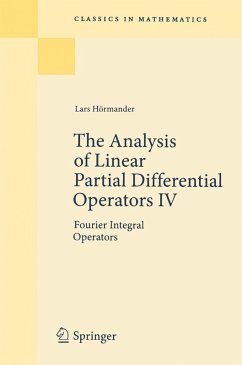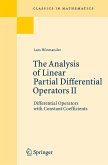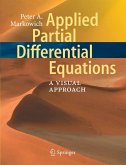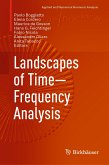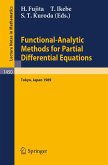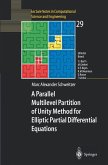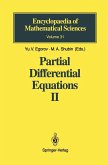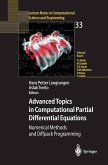From the reviews:
"Volumes III and IV complete L. Hörmander's treatise on linear partial differential equations. They constitute the most complete and up-to-date account of this subject, by the author who has dominated it and made the most significant contributions in the last decades.....It is a superb book, which must be present in every mathematical library, and an indispensable tool for all - young and old - interested in the theory of partial differential operators." L. Boutet de Monvel in Bulletin of the American Mathematical Society, 1987
"This treatise is outstanding in every respect and must be counted among the great books in mathematics. It is certainly no easy reading (...) but a careful study is extremely rewarding for its wealth of ideas and techniques and the beauty of presentation." J. Brüning in Zentralblatt MATH, 1987
"Volumes III and IV complete L. Hörmander's treatise on linear partial differential equations. They constitute the most complete and up-to-date account of this subject, by the author who has dominated it and made the most significant contributions in the last decades.....It is a superb book, which must be present in every mathematical library, and an indispensable tool for all - young and old - interested in the theory of partial differential operators." L. Boutet de Monvel in Bulletin of the American Mathematical Society, 1987
"This treatise is outstanding in every respect and must be counted among the great books in mathematics. It is certainly no easy reading (...) but a careful study is extremely rewarding for its wealth of ideas and techniques and the beauty of presentation." J. Brüning in Zentralblatt MATH, 1987
Dieser Download kann aus rechtlichen Gründen nur mit Rechnungsadresse in A, B, BG, CY, CZ, D, DK, EW, E, FIN, F, GR, HR, H, IRL, I, LT, L, LR, M, NL, PL, P, R, S, SLO, SK ausgeliefert werden.
From the reviews:
"Volumes III and IV complete L. Hörmander's treatise on linear partial differential equations. They constitute the most complete and up-to-date account of this subject, by the author who has dominated it and made the most significant contributions in the last decades.....It is a superb book, which must be present in every mathematical library, and an indispensable tool for all - young and old - interested in the theory of partial differential operators." L. Boutet de Monvel in Bulletin of the American Mathematical Society, 1987.
"This treatise is outstanding in every respect and must be counted among the great books in mathematics. It is certainly no easy reading (...) but a careful study is extremely rewarding for its wealth of ideas and techniques and the beauty of presentation." J. Brüning in Zentralblatt MATH, 1987.
"The fourth volume of the impressive monograph "The Analysis of Partial Differential Operators'' by Lars Hörmander continues thedetailed and unified approach of pseudo-differential and Fourier integral operators. The present book is a paperback edition of the fourth volume of this monograph. ... The book has been one of the most elegant, inspiring and influential texts in Mathematics, and contains results used in many important developments in Partial Differential Equations and Mathematical Physics." (Viorel Iftimie, Zentralblatt MATH, Vol. 1178, 2010)
"Volumes III and IV complete L. Hörmander's treatise on linear partial differential equations. They constitute the most complete and up-to-date account of this subject, by the author who has dominated it and made the most significant contributions in the last decades.....It is a superb book, which must be present in every mathematical library, and an indispensable tool for all - young and old - interested in the theory of partial differential operators." L. Boutet de Monvel in Bulletin of the American Mathematical Society, 1987.
"This treatise is outstanding in every respect and must be counted among the great books in mathematics. It is certainly no easy reading (...) but a careful study is extremely rewarding for its wealth of ideas and techniques and the beauty of presentation." J. Brüning in Zentralblatt MATH, 1987.
"The fourth volume of the impressive monograph "The Analysis of Partial Differential Operators'' by Lars Hörmander continues thedetailed and unified approach of pseudo-differential and Fourier integral operators. The present book is a paperback edition of the fourth volume of this monograph. ... The book has been one of the most elegant, inspiring and influential texts in Mathematics, and contains results used in many important developments in Partial Differential Equations and Mathematical Physics." (Viorel Iftimie, Zentralblatt MATH, Vol. 1178, 2010)

